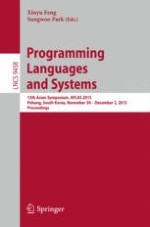2015 | OriginalPaper | Buchkapitel
Detection of Redundant Expressions: A Complete and Polynomial-Time Algorithm in SSA
verfasst von : Rekha R. Pai
Erschienen in: Programming Languages and Systems
Aktivieren Sie unsere intelligente Suche, um passende Fachinhalte oder Patente zu finden.
Wählen Sie Textabschnitte aus um mit Künstlicher Intelligenz passenden Patente zu finden. powered by
Markieren Sie Textabschnitte, um KI-gestützt weitere passende Inhalte zu finden. powered by
